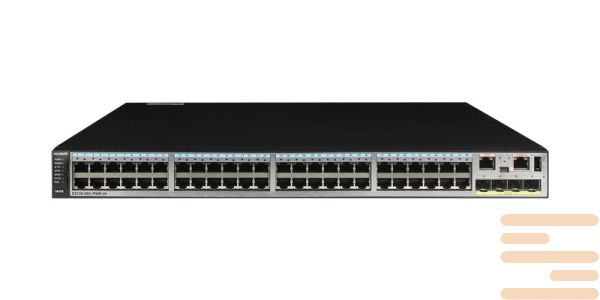|
Item
|
S5720-56C-PWR-HI-AC1
|
|
Fixed Ports
|
48 x 10/100/1,000 Base-T, 4 x 10 GE SFP+
|
|
Extended Slots
|
One port extended slot with optional subcard 4 x 10 GE SFP+
One slot reserved for the stack card
|
|
MAC Address Table
|
IEEE 802.1d standards compliance
128K MAC address entries
MAC address learning and aging
Static, dynamic, and blackhole MAC address entries
Packet filtering based on source MAC addresses
|
|
VLAN
|
4K VLANs
Guest VLAN, Voice VLAN
GVRP
MUX VLAN
VLAN assignment based on MAC addresses, protocols, IP subnets, policies, and ports
VLAN mapping
|
|
Wireless AC
|
AP access control, AP domain management, and AP configuration template management
Radio frequency management, unified static configuration, and dynamic centralized management
WLAN basic services, QoS, security, and user management
CAPWAP, Tag/terminal location, and spectrum analysis
|
|
Reliability
|
RRPP ring topology and RRPP multi-instance
Smart Link tree topology and Smart Link multi-instance, providing the millisecond-level protection switchover
SEP
G.8032 Ethernet Ring Protection Switching (ERPS)
BFD for OSPF, BFD for IS-IS, BFD for VRRP, and BFD for PIM
STP (IEEE 802.1d), RSTP (IEEE 802.1w), and MSTP (IEEE 802.1s)
BPDU protection, root protection, and loop protection
|
|
MPLS
|
MPLS L3VPN
MPLS L2VPN (VPWS/VPLS)
MPLS-TE
MPLS QoS
|
|
IP Routing
|
Static routes, RIPv1/v2, RIPng, OSPF, OSPFv3, IS-IS, IS-ISv6, BGP, BGP4+, ECMP, and routing policy
|
|
Interoperability
|
VLAN-Based Spanning Tree (VBST), working with PVST, PVST+, and RPVST
Link-type Negotiation Protocol (LNP), similar with DTP
VLAN Central Management Protocol (VCMP), similar with VTP
|
|
IPv6 Features
|
Neighbor Discover (ND)
PMTU
IPv6 Ping, IPv6 Tracert, IPv6 Telnet
ACLs based on source IPv6 addresses, destination IPv6 addresses, Layer 4 ports, or protocol types
Multicast Listener Discovery snooping (MLDv1/v2)
|
|
Multicast
|
IGMP v1/v2/v3 snooping and IGMP prompt leave
Multicast forwarding in a VLAN and multicast replication between VLANs
Multicast load balancing among member ports of a trunk
Controllable multicast
Port-based multicast traffic statistics collection
IGMP v1/v2/v3, PIM-SM, PIM-DM, and PIM-SSM
MSDP
|
|
QoS/ACL
|
Rate limitation in the inbound and outbound directions of a port
Packet redirection
Port-based traffic policing and two-rate and three-color CAR
Eight queues on each port
DRR, SP and DRR + SP queue scheduling algorithms
WRED
HQoS
Re-marking of the 802.1p and DSCP fields of packets
Packet filtering on Layer 2 to Layer 4, filtering out invalid frames based on the source MAC address, destination MAC address, source IP address, destination IP address, TCP/UDP source/destination port number, protocol number, or VLAN
Queue-based rate limitation and shaping on ports
|
|
Security
|
Hierarchical user management and password protection
DoS attack defense, ARP attack defense, and ICMP attack defense
Binding of the IP address, MAC address, interface number, and VLAN ID
Port isolation, port security, and sticky MAC
MAC Forced Forwarding (MFF)
Blackhole MAC address entries
Limitation on the number of learned MAC addresses
IEEE 802.1x authentication and limitation on the number of users on a port
AAA authentication, RADIUS authentication, HWTACACS authentication, and NAC
SSH V2.0
HTTPS
CPU protection
Blacklist and whitelist
DHCP relay/server/snooping/client/security
MACSec
|
|
OpenFlow
|
Multi-controller
Nine-level session table
Group table
Meter
OpenFlow 1.3
|
|
VxLAN
|
Supports the VxLAN function, supports VxLAN L2 and L3 gateways
Configured through the NETCONF protocol
|
|
Super Virtual Fabric (SVF)
|
Working as the parent node to vertically virtualize downlink switches and APs as one device for management
Supports a two-layer client architecture
|
|
iPCA
|
Directly coloring service packets to collect real-time statistics on the number of lost packets and packet loss ratio
Collection of statistics on the number of lost packets and packet loss ratio at network and device levels
|
|
Management and Maintenance
|
iStack
Virtual Cable Test
SNMP v1/v2c/v3
RMON
Network management system (NMS) and Web management
System logs and multi-level alarms
GVRP
MUX VLAN
802.3az Energy Efficient Ethernet (EEE)
NetStream
Dying Gasp upon power-off
|
|
Operating Environment
|
Operating temperature: 0°C to 45°C
Relative humidity: 5% to 95% (non-condensing)
|
|
Dimensions
(W x D x H)
|
442.0 mm x 420.0 mm x 44.4 mm
When a 1,150W power module is installed, it extrudes out from the chassis. Therefore, the total depth of the switch changes to 507 mm
|
|
Input Voltage
|
AC rated voltage: 100V to 240V, 50 Hz/60 Hz
Maximum voltage range: 90V to 264V, 47 Hz/63 Hz
|
|
Power Consumption
|
without PD: < 188.74W
with PD: < 1,036W (PD: 740W)
|

Log In